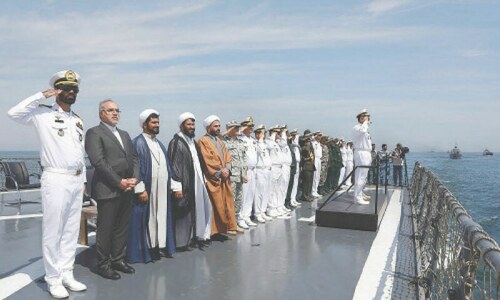ISLAMABAD: Experts have shown concerns over Pakistan’s snag on interstate gas pipeline projects as the country is facing the brunt on multiple fronts.
Speaking at a webinar, the experts said it undermined the country’s efforts to address its energy crisis and meet the growing demand for natural gas, leading to energy shortages and economic instability.
The webinar was organised by Devcom-Pakistan Centre for Geopolitical Studies on “Interstate gas pipeline projects: challenges and the way forward to meet Pakistan’s energy crisis” on Saturday.
Environment and energy consultant Qaiser Aijaz, Lahore Garrison University Associate Professor Dr Zainab Ahmed and Kinnaired College for Women Associate Professor Dr Khushboo Ejaz were among the speakers.
Qaiser Aijaz said in the light of current geopolitical situation, particularly domestic political instability coupled with Russia-Ukraine conflict, Israel-Palestine ongoing war and rising tensions at the Pakistan-Afghanistan border, it looked difficult to foresee any immediate progress on the interstate gas pipeline projects.
“Unfortunately, all interstate gas pipeline projects involve governments and regions which presently are baffled by their own set of problems including Russia, Iran and Afghanistan. Since all projects have been stalled for long, it would require a detailed review and revisit of engineering design studies, project costs and economic viability vis-à-vis sky rocketing rupee-dollar parity for smooth sailing of gas pipeline and infrastructure development projects,” he said.
Devcom representative Munir Ahmed said Pakistan’s failure to advance gas pipeline projects sparked national and international concerns.
“Iran sleeves up to drag Pakistan into the International Court of Justice (ICJ) by September 2024 for a $18 billion penalty. TAPI dusting the shelves for three years after a comprehensive feasibility report was approved. Russia is also uncomfortable with Pakistan’s snag. Pakistan’s foreign policy and energy diplomacy has failed miserably in the hands of inefficient white elephants. It has cost billions to the national exchequer since the 1990s. In the present situation, while the World Bank and other International Financial Institutions (IFIs) are reluctant, Pakistan shall urgently invite foreign investments on better incentives,” he said.
Dr Khushboo Ejaz painted a vivid picture of the intricate political economy surrounding pipeline projects where politics, economics and energy intersect. She described it as a delicate dance influenced by government regulations, environmental concerns and economic impacts, resulting in a complex landscape.
“In Pakistan’s pipeline diplomacy, securing energy resources and enhancing strategic positioning are high-stakes endeavours. The Iran-Pakistan gas pipeline, dubbed the ‘Peace Pipeline,’ symbolises hope but faces numerous obstacles. Similarly, the Turkmenistan-Afghanistan-Pakistan-India (TAPI) pipeline represents regional cooperation aspirations overshadowed by security threats and disagreements,” she said.
Dr Khushboo said the fate of those projects was uncertain, especially the Iran-Pakistan pipeline, amidst international sanctions, financial challenges and geopolitical tensions.
“The United States opposes it vehemently, shaping the narrative and influencing decisions. Pakistan grapples with its own issues – economic struggles, security threats and evolving energy dynamics – adding layers of complexity,” she said.
Dr Zainab Ahmed said the dynamics of geopolitics have shifted towards geo-economics with energy playing a central role.
“The world’s heavy reliance on fossil fuels, particularly in the developed world and Europe’s dependence on Russian gas, has been underscored by events such as the Russia-Ukraine war. For developing countries like Pakistan, which rely heavily on imported oil and are depleting their own gas reserves, finding regional and economical energy solutions is imperative. International gas pipeline projects such as the Iran-Pakistan pipeline carry significant geopolitical implications. Originally envisioned as the Iran-Pakistan-India pipeline, the project faced obstacles due to US sanctions on Iran which led to India’s withdrawal. However, the project’s completion could have transformed regional politics and spurred development in Baloch areas affected by violence.
“Despite the potential benefits of the Iran-Pakistan pipeline, US sanctions remain a major hurdle. Pakistan’s economic and political instability limits its options, leaving it dependent on IMF programmes and hindering investment. The US has supported alternatives like the TAPI and CASA-1000 pipelines, but these lack the benefits, cost-effectiveness, connectivity and joint interests of the Iran-Pakistan pipeline. The rivalry between the US and China further complicates the strategic environment with implications for regional cooperation. Pakistan’s attempts to persuade the US to reconsider its sanctions on the Iran-Pakistan pipeline have been met with predictable resistance,” she added.
Published in Dawn, March 31st, 2024















































